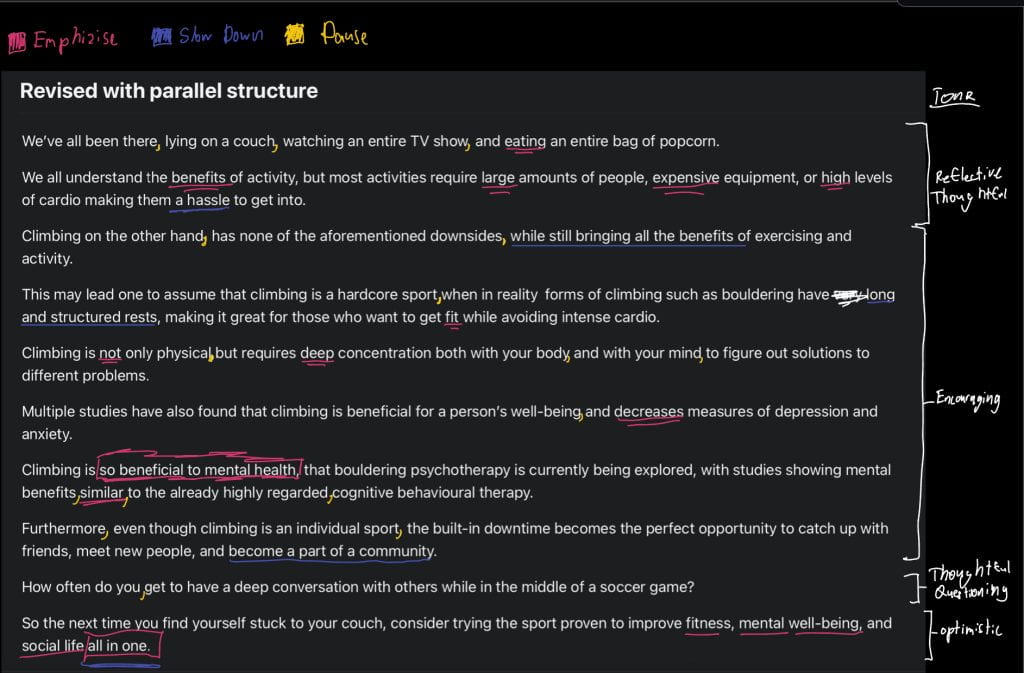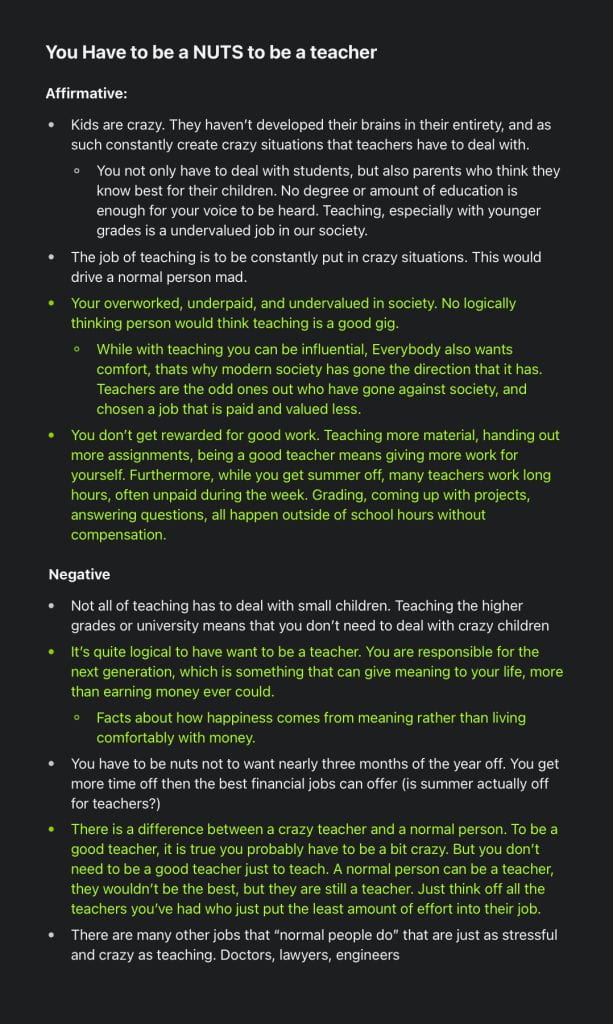Argue; it’s basically all we do nowadays. It seems the only thing we can agree on is our collective disagreement. So how do you convince an audience we are right. This was the driving question of our latest project, where we would hold a formal debate at our winter exhibition.
A formal debate is a structured event where two sides present opposing arguments to an issue. To convince an audience we are right requires an emotional argument, trustworthy evidence, and most importantly confidence as we discovered after our first attempt at debate. Turns out confidence is enough to persuade a class of 11th graders, but not enough to fool our teacher. I guess that’s the importance of knowing your audience.
To start off we a short speech on the best ___ ever that could be used to try out new techniques. One such technique was parallel structure, which is where you repeat grammatical structure to add rhythm and emphasize key points.

As I found in the practice speech, parallel structure is everywhere, but to use it purposefully and is great effect is a real challenge. It can be very subtle and nuanced to get right, like all good writing.
Be it resolved that post secondary education should be free for all Canadian citizens.
This was the issue that I along with my good friend Sabrina decided to argue. I was arguing in the affirmative, while Sabrina would argue in the negative. To skip ahead a bit, here is our final debate held live at the winter exhibition:
Going back to the project, once we had our topic decided, it was time to dive head-first into research. Long story short, I did quite a bit of research that was incredibly helpful when it came to the rebuttal, but I’ll talk about that once I get there.
For now, it was time to write a speech. I revised my speech up until the very last moment. Unexpectedly, the hardest part was getting the speech inside the four-minute time limit. Many times I would rearrange entire sentences just to get rid of a single word. Eventually, this led to a speech that took precisely 4 minutes and 3 seconds to get through during practice, which ballooned to 4 minutes and 10 seconds during the actual debate. Turns out I actually talk slower when I’m stressed.
While the speech went through many revisions, the basic structure and idea did not, which surprised me. Most of the time, my writing goes through drastic changes as I get feedback. However, with this speech, I liked the way it sounded from the beginning, letting me focus on smaller changes like parallel structure and word count.
The one piece of feedback I tried to fix before the debate was more variety in my tone of voice. Public speaking isn’t something I do very often, and as a result, I don’t pay much attention to how I speak. This means that my speech can be quite monotone, which is boring to listen to. We practiced using different tones earlier in the project with our practice speeches. With mine, I wrote down a few adjectives that correspond with my desired tone, as well as where to emphasize, slow down, and pause.

I found this to be quite helpful, so when it came to my actual debate speech, I decided to try the same thing.

By far the most stressful part of this project was the rebuttal. This was due to the fact that we can only talk against what our opponents say. The only problem is that I don’t know what my opponent’s argument is until she says it during the debate. This poses a real challenge because I’m terrible at speaking on the spot. However, what I can do is figure out what arguments my opponent is going to make beforehand. We practiced creating a rebuttal in class once, and these were my arguments after just hearing each speech.

Out of all the work we did, I’m most proud of my rebuttal prep. For the actual debate, I expanded what we worked on in class into 7 arguments against what I thought my opponent would argue. Each of these arguments had multiple different studies and evidence that I could reference to dispute my opponent’s claims. Most importantly this information meant that I didn’t need to completely improvise, which is a skill I’m notoriously bad at. I had so much evidence that I wish the time limit was longer than 1 minute, as I ran out of time still with more to say.
Overall, the debate went as smoothly as I could have hoped. I’m extremely happy with my writing during this project, and I hope it will continue to improve. The biggest takeaway would be improving at public speaking, and making my voice sound interesting to listen to. It’s a skill that would have dramatically improved past projects like the podcasts and can continue to work on in the future, although I am pleased with the progress I was able to make in the few days that I had to work on it.
See you next time,
Nolan🙅🏻♂️



